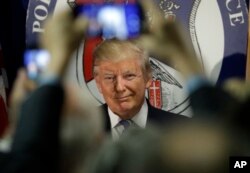Donald Trump and Hillary Clinton are campaigning Thursday in the states where each won their first victory on the path to becoming the next U.S. president.
Trump has an event in New Hampshire and Clinton is speaking in Iowa, states that played a big role as the first two to hold votes during the party nominating process that began eight months ago but which will have much less influence on the outcome of the November 8 general election.
The reason is the electoral college system that give more weight in the presidential vote to more populous states such as Michigan, where Trump will be Friday, and Florida, where Clinton's Friday schedule includes two rallies. Michigan carries 16 electoral college votes and Florida 29, while Iowa and New Hampshire have 10 combined.
Clinton campaigned Wednesday in New Hampshire alongside Vermont Senator Bernie Sanders, her one-time rival in the Democratic Party race, telling a crowd of students that the outcome of the election will reverberate for decades.
"The next 40 days will determine the next 40 years," Clinton said. "So I'm going to close my campaign the way I started my public service and my career, fighting for kids and families, that's been the cause of my life and it will be the mission of my presidency."
Sanders, whose own campaign promoted efforts to address income inequality, criticized Trump's economic plans that he and Clinton have said are focused on benefits for the rich.
"At a time when we have massive levels and wealth inequality, it is absurd, it is disgraceful for Donald Trump and his friends to be talking about hundreds of billions of dollars in tax breaks for the top 1 percent," Sanders said.
Trump had his own declaration about the remaining time in the race, telling supporters in Wisconsin, "We have six weeks to make every dream you've ever dreamed for your country come true."
He also criticized Clinton on Wednesday for what he said was her taking too many days off from campaigning, and accused internet search giant Google of suppressing bad news about her.
After the first presidential debate Monday, independent political analysts widely gave Clinton the edge after she kept Trump on the defensive, attacking him for not releasing his U.S. tax returns for public scrutiny, his lengthy history of slurs against women, and his years-long campaign to try to prove the debunked claim that President Obama was born in Kenya and is not a U.S. citizen.
In the immediate aftermath of the debate, watched by a record of more than 80 million Americans, political analysts suggested that Clinton, locked in a tight race with Trump, could pick up an additional two percentage points or more of support. The Politico/Morning Consult poll, which had Trump ahead by one point before the debate, said its first post-debate polling now showed Clinton with a three-point edge, a four-percentage-point gain.
Trump's advisers say they are frustrated by his debate performance and intend to try to get him to practice more before his next encounter with Clinton set for October 9, the second of three planned debates. Trump had resisted intensive preparation before the Monday matchup, the Trump aides told The New York Times.





